|
HUMAN RIGHTS FOR EACH PERSON REGARDLESS OF AGE, RACE, RELIGION OR POLITICS
|

|
|
|

|
GUANTANAMO BAY PRISON CAMP
|
The Guantanamo Bay detention camp is a controversial detainment and interrogation facility of the United States military located within Guantanamo Bay Naval Base, Cuba. The facility was established in 2002 by the Bush Administration to hold detainees from the war in Afghanistan and Iraq. The detainment areas consist of three camps: Camp Delta (which includes Camp Echo), Camp Iguana and Camp Xray, the last of which is now closed. The facility is often referred to as Guantánamo, G-Bay or GTMO, after the military abbreviation for the Guantanamo Bay Naval Base.
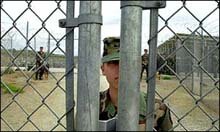 Many who were/are held at this facility are held in the legal limbo no-mans-land of Guantanamo Bay Prison Camp [CUBA]. The detainees have been accused of terrorist-related activity. Many who were/are held at this facility are held in the legal limbo no-mans-land of Guantanamo Bay Prison Camp [CUBA]. The detainees have been accused of terrorist-related activity.
The US government deemed Cuba the most secure environment for their detainment, interrogation and trial. As long as the prisoners are not on US soil they are denied the rights guaranteed to criminals under the American constitution, such as a presumption of innocence and a trial by jury.
Since January 2002, 779 men have been seized and brought to Guantanamo. Eight men died in the prison camp and 600 have since been released. Most of them have been released without charge or transferred to facilities in their home countries. The Department of Defense often referred to these prisoners as the "worst of the worst", but a 2003 memo by then Secretary of Defense Donald Rumsfeld says, "We need to stop populating Guantanamo Bay (GTMO) with low-level enemy combatants ... GTMO needs to serve as an [redacted] not a prison for Afghanistan."
As of June 2012, 169 prisoners remain at Guantanamo. About half have been cleared for release, yet have little prospect of ever obtaining their freedom.
A number of children are detained in GMTO in apparent contravention of international law.
 What is the status of the detainees under international law? What is the status of the detainees under international law?
The US insists that the detainees do not qualify for prisoner-of-war treatment under the Geneva Conventions, because they are not members of the regular Afghan armed force - nor do they meet the criteria for prisoner-of-war status for voluntary forces.
These criteria include wearing uniform and carrying arms openly. Washington has categorized the detainees as "unlawful combatants".
United Nations argue that the armed conflict in Afghanistan is of an international nature and the law of international armed conflict, the Geneva Conventions, should apply.
What does the legal argument mean for the detainees?
If the alleged al-Qaeda and Taliban members are not legally prisoners of war, then they are not entitled to various protections provided by the Geneva Conventions. These protections include certain restrictions on the interrogation of prisoners, the prohibition of cruel and degrading treatment, and a ban on torture.
Amnesty International have reported: In the name of internal security, governments have indicated that they would infringe on basic rights of citizens under the special circumstances of global terror threat. Laws have been enacted in various countries that violate Universal Human Rights. Amnesty says these laws are being abused. Amnesty was particularly critical about over 600 prisoners detained for over 18 months in the Guantanamo Bay prison camp.
Click Here to read the article -U.S. rejects Amnesty charge
|
|
Inside Guantánamo Bay
|
 Human rights lawyer Clive Stafford-Smith talks to AI about his experiences inside the notorious US detention centre at Guantánamo Bay, Cuba Human rights lawyer Clive Stafford-Smith talks to AI about his experiences inside the notorious US detention centre at Guantánamo Bay, Cuba
I went to Guantánamo for the first time in November [2004] and I’ve been back four times now. You’re never quite sure whether to laugh or cry when you’re there. The soldiers go around saluting each other saying, "Honour bound, sir," and the other says, "To defend freedom".
I think if you’d been asking two years ago, would we be closing Guantánamo, it wouldn’t have been on the radar screen. Now Guantánamo is in its death throes, but of course, it’s always been a distraction from the real issues. And the real issues are if you’ve got 520 people in Guantánamo, there are probably another 12,000 folk who are being held in US detention centres around the world and being abused there. The bigger problem is, what’s the substitute? Unfortunately, I think, the US has plans to take a lot of prisoners away from Guantánamo to Bagram airforce base and beyond. We have to start thinking beyond Guantánamo Bay to all the other detention centres and American proxy prisons around the world.
|
|
Guantanamo Bay: The testimony
|
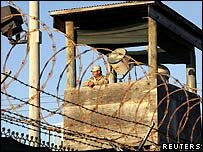
It could take weeks for the documents to be fully analysed
|
The US defence department has for the first time put the names of detainees to transcripts of tribunals at Guantanamo Bay.
But the 6,000 pages of documents released under the Freedom of Information Act do not always name the person attending the tribunal. Many as listed as "detainee".
It is not always clear who has been released and who is still held and it could take weeks for the documents to be fully analysed.
Here is some of the named evidence given at hearings:
|
|
FAIR GO FOR DAVID
|
|
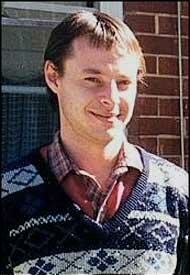
- David Hicks, an Australian citizen has been held at Guantanamo Bay for more than three years. He has been denied his human and legal rights under the Geneva Conventions, the Torture Convention and the Universal Declaration of Human Rights.
- Neither the Australian government nor the US government has alleged that David is a member of al Qaeda yet he has been denied his most fundamental right – the presumption of innocence.
- The military commission set up to try David falls far short of accepted standards for any judicial proceedings including those under the US justice system, US court martials and the Australian justice system.
- David has not engaged in any attack or conspired to engage in any attack against US forces or installations, as he was held prisoner by members of the Northern Alliance in Afghanistan prior to the US invasion of that country in 2002. The contention that David is an “unlawful combatant” is a contrived legal nonsense, all the more that he has never engaged in hostilities against US forces.
- The Australian government has taken no material steps to protect the legal and human rights of one of its own citizens and seems content to wait for the US government to determine his fate: this notwithstanding the strong actions taken by governments of other countries, including Great Britain, to secure the release and return of their nationals previously held under identical circumstances.
- The Australian government has ignored calls from eminent jurists around the world, calling for the release of detainees from Guantanamo Bay and condemning their treatment at the hands of the US administration, in contravention of international law.
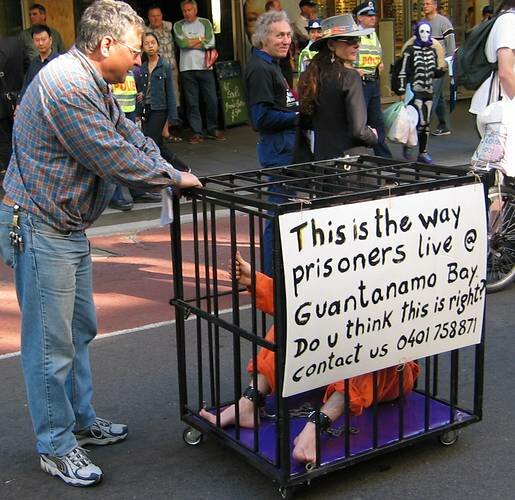
- Recently, the Parliamentary Assembly of the Council of Europe passed a resolution condemning the US administration for the torture of detainees at Guantanamo Bay and calling on all member states not to cooperate in the interrogation of US detainees or in the rendition of suspects to US custody.
- In addition, the resolution called on the US administration to cease its practice of ‘secret detentions’ and to initiate an independent investigation of the hundreds of allegations of torture and ‘cruel, inhuman and degrading’ treatment being meted out against detainees at Guantanamo Bay.
|
|
|
A senior Defense Department official has stated that at least one-third of the prisoners at Guantanamo are completely innocent of any wrongdoing.
Tragically, many of the prisoners had put themselves in harms way to fulfill a sacred religious duty. Islam ordains charitable work. Many of these men are teachers. They are pious men bound by a great tradition to make sacrifices on behalf of other human beings
The PRISONERS
F.P.S.S would like to acknowledge Project Kuwaiti Freedom as the source of this information.
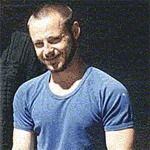
|
Full name: David Hicks
Nationality: Australian
Age: 29
Family status: Single with two children aged 10 and 11
Occupation: Horse trainer/Jackaroo
"I have been beaten before, after and during investigations. I have been menaced and threatened, directly and indirectly, with firearms and other weapons before and during investigations." David Hicks.
|
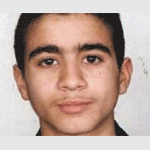
|
 Canadian national: Omar Khadr Canadian national: Omar Khadr
Full name: Omar Khadr
Nationality: Canadian
Age: 19
"Young enemy combatants are treated in a manner appropriate to their age and status." Letter from Deputy Assistant Secretary of Defense Paul Butler to Amnesty International, July 2003.
|
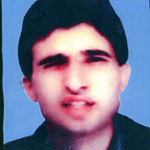
|
Full name: Omar Deghayes
Nationality: Libyan citizen/UK resident
Age: 35
Family status: Married with a three year-old son
Occupation: Lawyer
"If torture and abuse had a smell, none of the American soldiers would be able to sit next to anyone else." Omar Deghayes.
|
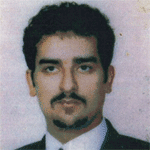
|
Jumah Mohammed Abdul-Latif al-Dossari
 Nationality: Bahraini national Nationality: Bahraini national
Age: 32
Family status: Divorced with a young daughter
"He pushed his face and he smashed it into the concrete floor…There was blood everywhere. When they took him out they hosed the cell down and the water ran red with blood. We all saw it." Released Guantánamo detainees speaking about the torture of Jumah al-Dossari.
|
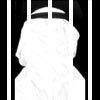
|
Yemeni national: Abdulsalam al-Hela
Full name: Abdulsalam al-Hela
Nationality: Yemeni
Occupation: Businessman
Age: 34
Family status: Married with two children
"Contact with him suddenly stopped…when we called him, his mobile phone rang but there was no answer". Abdulsalam al-Hela's brother, talking of his brother's "disappearance"
|

|
Sudanese national: Sami al Hajj
Full name: Sami al Hajj
Nationality: Sudanese
Occupation: Cameraman/journalist
Age: 35
Family status: Married with one child
|

|
Chadian national: Mohammed el Gharani
They did not ask me my age until I had been in Cuba for a year."
"Before I came to Camp V, I had hope. After this I lost all hope."
Mohammed el Gharani.
|
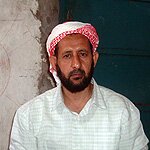
|
Muhammad Abdullah Salah al-Assad
Full name:
Nationality: Yemeni
Age: 45
Family status: Married, five children
Amnesty International has received consistent reports that the US authorities have a network of secret detention centres around the globe, holding an unknown number of "war on terror" detainees in unknown conditions In September 2005, Amnesty International spoke with Muhammad al-Assad, a man who had been caught up in this sinister system. He was effectively disappeared" by the US for over 16 months.
|
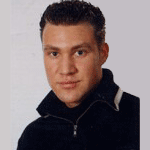
|
Full name: Murat Kurnaz
Nationality: Turkish
Family status: Married, no children
Occupation: Apprentice ship builder
"I am here having lost a few years of my life because of Usama Bin Laden. His beliefs show Islam in the wrong way. I am not angry with Americans. Many Americans died on 11 September in the terrorist attack. I realize the Americans are trying to stop terrorism… I went to study in Pakistan at the wrong time…"
Murat Kurnaz.
|

|
Full name: Mustafa Ait Idir
Nationality: Bosnian
Age: 35
Family status: Married with three young sons
Occupation: Reportedly worked for the humanitarian organization Igasa
"Muhamed was four when Mustafa was taken away. But he still remembers every moment he spent with him. And every day, I keep telling him that his father is on business trip, and he will come soon. Lately I noticed that he is not that happy and excited anymore. I think that he doesn't believe me anymore."
Wife of Mustafa Ait Idir.
|

|
Full name: Abdel Malik Abdel Wahab
Nationality: Yemeni
Age: 22
Family status: Married with a four-year-old daughter
Occupation: Teacher/student
"We have nothing here, no rights, no trials, nothing."
Abdel Malik Abdel Wahab, speaking about detention in Guantánamo Bay
|
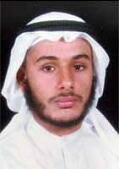 |
Fawzi Khaled Abdullah Fahad Al Odah -- is a 25 year-old teacher who once spent his summers traveling in poor nations to educate less fortunate students. Fawzi and his family have built libraries and wells in Africa. 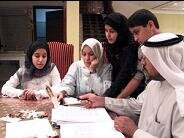 They’ve sponsored orphans in countries like Albania. After September 11th, Fawzi decided to remain in the Afghanistan-Pakistan region to help the flood of refugees. His family soon lost contact and did not learn that he had been taken prisoner until January 2002, when they heard he was being held by the U.S. Fawzi has no weapons training or experience. On May 7, 2002, Fawzi sent his parents a letter saying, “Now I am detained by the American forces and investigations are still going on…I will be established as innocent soon, and then I will return back to you…” Fawzi’s father, Khalid Al-Odah, is the head of the Kuwaiti Family Committee, an organization formed by relatives of the detainees to advocate for their just treatment under the U.S. judicial system. The elder Al-Odah is a former member of the Kuwaiti Air Force, who trained with American servicemen in the United States and flew missions with them as an ally in the Persian Gulf War of 1991. They’ve sponsored orphans in countries like Albania. After September 11th, Fawzi decided to remain in the Afghanistan-Pakistan region to help the flood of refugees. His family soon lost contact and did not learn that he had been taken prisoner until January 2002, when they heard he was being held by the U.S. Fawzi has no weapons training or experience. On May 7, 2002, Fawzi sent his parents a letter saying, “Now I am detained by the American forces and investigations are still going on…I will be established as innocent soon, and then I will return back to you…” Fawzi’s father, Khalid Al-Odah, is the head of the Kuwaiti Family Committee, an organization formed by relatives of the detainees to advocate for their just treatment under the U.S. judicial system. The elder Al-Odah is a former member of the Kuwaiti Air Force, who trained with American servicemen in the United States and flew missions with them as an ally in the Persian Gulf War of 1991. |
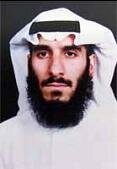 |
Omar Rajab Mohammad Rajab Amin -- is an agricultural supervisor for the Care Houses department of the Kuwaiti Ministry of Social Affairs and Labor. In 1993 he began working for Kuwait’s Combined Relief Committee, assisting refugees in Bosnia-Herzegovina. He married a Bosnian woman in 1994, returning to Kuwait in 1998 where he lived happily with his wife and four children. When the refugee situation arose in Pakistan and Afghanistan in the fall of 2001, Omar collected money and took a short leave of absence from work to assist the refugees. He intended to return to Kuwait quickly as his five-year old son was scheduled for a heart operation. He had never been to Afghanistan or Pakistan before, and most likely tried to flee with the other refugee workers when the violence erupted. Meanwhile, his son was operated on successfully and his wife was pregnant with their fifth child. In a Red Cross letter he wrote from Guantanamo, he says, “My dear wife, I pray that you are well and in good health and I hope that you will receive this message after you have safely given birth to the newly born baby…Please be advised that my imprisonment will not be for long. I have always done good for those who are in distress.” |
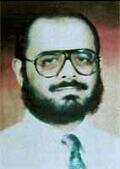 |
Fouad Mahmoud Al Rabiah -- is an Aviation Engineer for Kuwaiti Airlines and a father of four children. He is an international graduate of Embry-Riddle Aeronautical University and was granted honorary citizenship by the Chamber of the Daytona Beach-Halifax area. He worked on a rescue campaign in Kosovo in 1988 as a Red Crescent humanitarian aid worker and in 2000 he delivered a consignment of medicine to Bangladesh for patients suffering from kidney disease. In 2001, he delivered more than 30 trucks of aid from Meshad, Iran to refugees on the Afghani-Iranian border and to hospitals in Kandahar. In a Red Cross letter he wrote, “As you know, I traveled to deliver rescue materials…the situation in this country turned upside down overnight, and now every Arab citizen has become a suspect.” The 44 year-old Fouad suffers from several serious health conditions. |
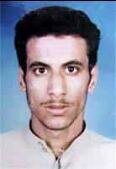 |
Nasser Nijer Naser al Mutairi -- is a 25 year-old teacher and minister who worked for the Ministry of Education in Kuwait. He left his home in October of 2000 in order to minister in the small mosques and schools of Afghanistan 's poorer regions. He is a member of the Tableeghi sect, an order of apolitical and peaceful missionaries. In October of 2002, the Kuwaiti Ministry of Foreign Affairs informed Nasser's family that he had taken ill and was in a hospital in Kandahar. It is not known why or how he was deported from the hospital to Guantanamo Bay. In fact, very little is known of his condition, other than that he has asked his parents to contact the Red Cross on his behalf. |
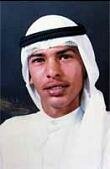 |
Khalid Abdullah Mishal al Mutairi -- was working at a primary school as a messenger and planned to return to school in 2001. His family has funded agricultural projects in Pakistan, bought farms for the poor in India, and supported an orphan girl in Bosnia. In 2001, Khalid traveled to Pakistan to help repair a mosque his family had funded. The last time his family spoke to him, he said he wanted to assist the Afghani refugees and that he would be home by December, 2001. It is not known why or how he ended up in detention in Guantanamo Bay. |
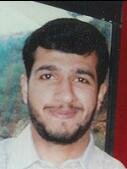 |
Abdullah Kamal Abdullah Kamal Al Kandari -- is a mechanical technician and father of four. In 2001, he traveled to the Afghani-Pakistani border to help in the refugee relief. The last time he spoke to his family in October of 2001, he told them that “all Arab citizens are wanted, whether they are warriors or members of relief agencies.” In a Red Cross letter, he wrote, “I would like news of my family, especially of my pregnant wife. Did she give birth yet? …I will be back soon, [it] is only a matter of time until they find me innocent and learn that I did not fight, but I came to help the poor and needy and that I was trapped in Afghanistan against my will…Please be advised that I do not know where I am, but the authorities say the state I am in is Cuba.” |
|
|
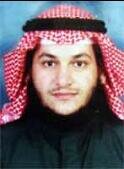 |
Abdulaziz Saver Owain al Shammari -- is a 30 year-old teacher and a father of two. He departed Kuwait for Pakistan in October, 2001 to start up an operation with local aid groups to help the refugees. He contacted his family, saying that the situation was unstable and that he would return home as soon as he had finished his mission. The next they heard from him was a Red Cross letter from Guantanamo. “Dear father,” he wrote, “I have informed them about everything relating to me and that I only went to Afghanistan to teach, and that I have nothing to do with the war. They said that they are going to verify these facts and, if they are true, they will release me. Every time, they say they are going to release me soon… “I have gone on a hunger strike for 27 days and I will continue the strike indefinitely. Further, I am not drinking water or speaking for four days until they set me free or take me to court for trial in order to obtain all my rights. Or I will die, as I can not stand life in this place.” Abdulaziz is believed to still be alive in the Camp Delta detention facility in Guantanamo Bay. |
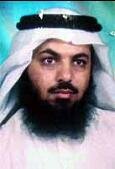 |
Mohammed Fenaitel Mohamad Al Daihani -- was an auditor in the Kuwaiti Audit Bureau and a father of six children. In 1993, his family funded the building of a well in the Philippines and, the following year, he purchased a farm in Indonesia for a local orphan village to use for food. In 1995, he funded the construction of a mosque in the republic of Benin. On September 9, 2001, Mohammad left Kuwait to use the two remaining weeks of his annual leave to provide aid to the Afghan refugees settling on the border after fleeing the harsh conditions of life under the Taliban. After September 11th, he contacted his family to say that the borders had been closed and only women, children, and the elderly were being allowed to leave. He contacted them later, saying “I am currently detained by the American army. They know that I was in Afghanistan to dig water wells and that the borders were closed, so I could not get out of the country. Yet they are still investigating.” His family has no means of income while he is detained, and he worries about their suffering. |
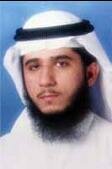 |
Fayiz Mohammed Ahmed Al Kandari -- is a 27 year-old student who went to render aid in Afghanistan during his 2001 summer vacation. It was his belief that helping others might honor his grandmother, who had just died, and bring better health to his mother, who is suffering from cancer. After being captured by U.S. forces, he wrote in a message to his family that an American investigator had questioned him and found nothing against him, and he believed he would soon be freed. He wrote in a Red Cross letter, “If the construction of a mosque…or the digging of a well is the sin that makes me a detainee, then I willingly accept my detention.” |
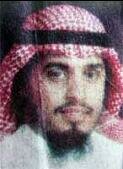 |
Adil Zamil Abdull Mohssin Al Zamil -- worked in the Kuwaiti Public Authority for Housing Care, and is the father of 8 children. Since their father has been detained, they have had no means of income. Adil’s father is too ill to care for his grandchildren. It is believed that Adil was arrested in Pakistan at the end of February, 2002 by a group of Pakistani and U.S. personnel, though the reason for his arrest is not known. |
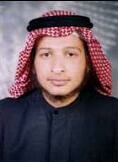 |
Saad Madai Saad Al-Azmi -- 24 traveled to Kabul, Afghanistan in July 2001 to supervise charitable projects, including the construction of mosques. After the bombing of Afghanistan began following September 11th, Saad left for Pakistan where he stayed for about a month. He then traveled to Lahore, Pakistan for several weeks, then on to Karachi in January in order to arrange transportation back home to Kuwait. For unknown reasons, he was detained in Pakistan and eventually was taken by the U.S. to Guantanamo. |
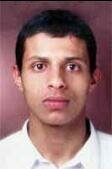 |
Abdullah Saleh Ali Al Ajmi -- is a 25 year-old lance corporal in the Kuwaiti army. He is a member of the apolitical Tableeghi sect. His family says that he decided to take a leave of absence from the army in order to “rescue the needy and the poor” in Pakistan. A month after he left Kuwait, he contacted his family to tell them that he was successfully carrying out aid work. The next his parents heard from him was a Red Cross postcard from Guantanamo. |
|
British Citizens held in Guantanamo Bay
|
| Bisher al-Rawi |
one of nine British residents held in Guantanamo |
More Info |
| Jamil El Banna |
one of nine British residents held in Guantanamo |
More Info |
| Jamal Abdullah Kiyemba |
one of nine British residents held in Guantanamo |
More Info |
| Shaker Abdur-Raheem Aamer |
one of nine British residents held in Guantanamo |
More Info |
| Omar Deghayes |
one of nine British residents held in Guantanamo |
More Info |
|
Zohra Zawawi, mother of Omar Deghayes Plea |
| Binyam Mohammed al-Habashi |
one of nine British residents held in Guantanamo |
More Info |
| Ahmed Errachiddi |
one of nine British residents held in Guantanamo |
More Info |
| Ahmed Ben Bacha |
Algerian who lived in Bournemouth. |
More Info |
| Abdulnour Sameur |
an Algerian refugee who lived in South Harrow, London. |
More Info |
|
Statements & Testimony by inmates of Guantanamo Bay
|
|
|
|
Pictures from Behind the wire of Guantanamo Bay (Cuba)
|
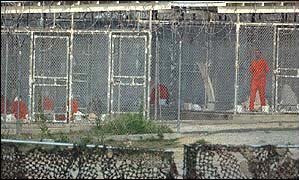
|
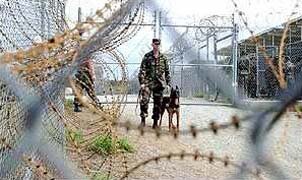
|
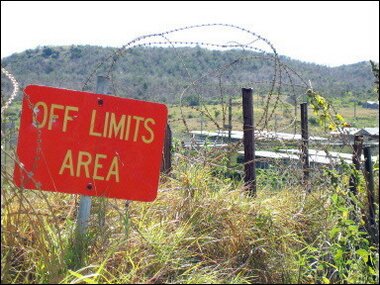
|
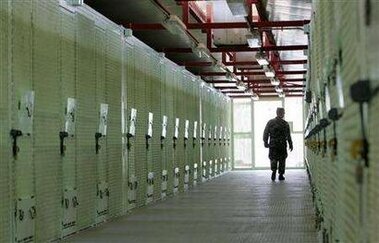
|
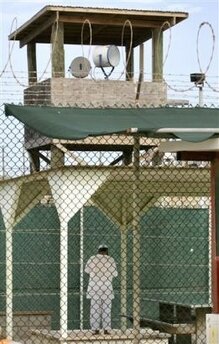 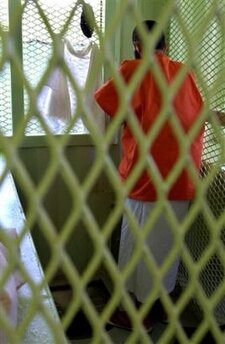
|
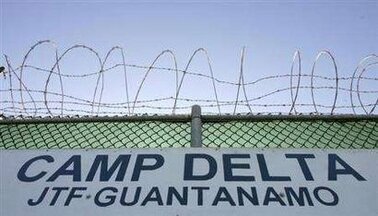
|
|
LATEST NEWS, INFORMATION, RELATED LINKS & SUPPORT SITES
|
|
- The major turns to PR to bring Hicks home
- Government should learn and act on Hicks: Greens
- David Hicks a 'mess', says father
- Law Council: Blame politicians, not Hicks' lawyers
- Hicks' lawyer doubts repatriation plan
- Hicks proud about fatherhood nomination
- Bay prisoner 'is no threat'
- Canadian Guantanamo detainee Khadr fires US lawyers
- I can't take much more, Hicks tells his father
- Hicks 'tortured' in jail
- Senate vote on Hicks, Guantanamo closure
- Released Detainees Refute US Guantanamo Suicide Cover Up
- Statement on the Deaths in Guantánamo Bay By Joint Former British Detainees
- Tarek Dergoul: Another Guantanamo Whitewash
- Statement from Former Guantanamo Detainee, Abdullah Alnoaimi on Guantanamo Deaths
- UK to consider helping Australian at Guantanamo
- Strong reaction to Guantanamo deaths
- US Guantanamo remarks 'inhumane'
- Criticism of Guantanamo rises; Pentagon IDs 3 who killed selves
- Saudi suspicion over Guantanamo deaths
- Judges seek fair trial for Hicks
- Natasha Stott Despoja: Speak out in the name of democracy
- Hicks letter welcomed
- David Hicks stays put in limbo
- 60 minors at Guantanamo
- The children of Guantanamo Bay
- Children face same conditions as adults at Guantanamo: report
- United Nations to USA: Close Guantanamo Prison
- Gitmo inmates attack guards stopping a suicide
- Guantanamo prison has served its time
- 67 Pakistanis in Guantanamo jail
- Guantanamo, Target of World Criticism, Seems Set for Long Life
- Riot at Guantanamo Bay detention camp
- Fifteen Guantanamo Saudis freed
- Guantanamo violates international law
- Senator Stott Despoja Statement Regarding David Hicks.
- FPSS Urgent Appeal for David Hicks
- UK govt may lodge another Hicks appeal
- Government blasted for Hicks detention
- Health concern/Torture: Jumah al-Dossari
- USA: The secretive and illegal US programme of 'rendition'
- Court dismisses British Govt's appeal against Hicks' citizenship
- Hicks’ trial "politically motivated" Mori says.
- Hicks Bereft of Hope in Guantanamo, Says Lawyer
- Michael Mori Thanks Melbourne Uni For Help in Hicks Case
- Military trial hope for Hicks
- Britain complicit in Guantanamo Bay human rights abuses committed by US
- Statement in response to rule change banning the use of evidence obtained by torture
- Blair Refuses to Meet Guantanamo Detainee Hicks' Dad
- New Guantanamo Bay like US Run Afghanistan Prison very primitive!
- Associated Press sues Defense Department for Guantanamo Prisoner Names
- Physicians write Blair regarding the medical attention in GBDavid Hicks receives support from Australian Democrats
- Hicks petition launched by Democrats
- Guantánamo and beyond: The continuing pursuit of unchecked executive power
- Latest David Hicks Petition
- Letter approving interogation techniques at Guantanamo Bay
- Lawyer fears for 'tortured' Australian
- Australian prisoner's torture claims 'taken seriously'
- Australian 'tortured' in secret Iraqi prison
- Consul's risky Iraq mission
- Guantanamo by the Numbers
- Concerns over force feeding at Guantánamo Bay
- Real tales from Guantanamo Bay Papers released by U.S. show inmates' defiance and despair
- The case for closing Guantanamo is overwhelming
- USA: Amnesty welcomes UN call to close Guantánamo Bay – but it is tip of iceberg
- Report: Guantanamo Lives torn apart
- Guantanamo Tube Feedings Humane, Within Medical Care Standards
- Guantánamo detainees: 4 years without justice
- Letter of protest to George Bush
- Hicks Speaks to Father & is concerned about UK appeal
- David Hicks Wins U.K. Citizenship
- Govt should feel embarrassed over Hicks: lawyer
- Father of Australian Guantanamo detainee welcomes British decision
- Australia may not welcome British citizen Hicks back home
- Guantánamo- Hunger Strikers seriously ill
- Guantánamo - only the tip of an iceberg of abuse.
- Cover story: Inside Guantanamo
- Largest-ever gathering of former Guantánamo prisoners and prisoners’ familiesTorture is killing a person without them dyingPM blames Hicks' lawyers for case delay
- Guantanamo Bay, Bagram and beyond Joint press conference
- Aussie Taliban offered prostitutes for information: ex-chaplain
- Hicks's jail time 'would not count toward sentence'
- Hicks's jail time should count: Downer
- United Kingdom: to use "torture evidence" in courts is to accept the unacceptable
- Law lords consider 'torture' appeal
- Our statement against torture and ill-treatment and our demands
- Update on Guantánamo: Hunger strike ends but Amnesty remains concerned about welfare of detainees
|
|
|
|